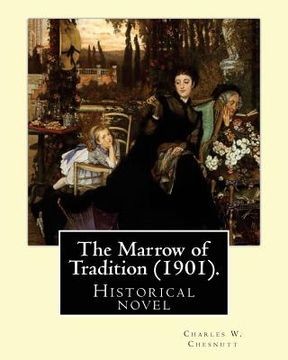The Marrow of Tradition (1901). By: Charles W. Chesnutt: Historical novel (en Inglés)
Reseña del libro "The Marrow of Tradition (1901). By: Charles W. Chesnutt: Historical novel (en Inglés)"
The Marrow of Tradition (1901) is a historical novel by the African-American author Charles W. Chesnutt, set at the time and portraying a fictional account of the Wilmington Insurrection of 1898 in Wilmington, North Carolina.Plot summary: Set in the fictional town of Wellington, The Marrow of Tradition features several interweaving plots that encompass the poles of the racially segregated society of the American South at the turn of the century. One plot follows Major Carteret, the white owner of the major Wellington newspaper, as he colludes with several other powerful white men to take political control of the town. They are outraged about a provocative editorial published in a black paper that questioned white justifications for lynchings. As the town's unrest intensifies, Carteret faces domestic pressures; his only child Dodie and wife Olivia are both unwell. Carteret's niece Clara, recently introduced to society, is courted by the young Tom Delamere, a handsome and conniving aristocrat who spends most evenings nurturing his penchant for drink and cards. His habits are contrasted with those of Lee Ellis, a rival for Clara, and William Miller, a young black physician who with his wife has returned to his hometown of Wellington to practice medicine. He gained his medical education in Paris and Vienna. Though jarred by segregation and Jim Crow racism, Miller sets up his practice and starts his life. Miller's wife, Janet, is the mulatto half-sister of Mrs. Olivia Carteret; Janet spends her entire life hoping to be acknowledged by her white sister, who is too proud to accept her father's miscegenation after her mother died. Josh Green as a boy witnessed the murder of his father at the hands of a white man-a character named Captain McBane-and is intent on exacting revenge. All these subplots are forced to a crisis through two events: the murder of a white woman, Polly Ochiltree, for which a black servant, Sandy Campbell, is accused, and county elections. Campbell would have been lynched and burned without a trial if it weren't for Miller alerting his boss, the grandfather of the actual murderer, Tom Delamere. Old Mr. Delamere and Lee Ellis discover the truth and save Sandy's life, but Tom is never apprehended for his crime. A few months later, on the eve of the elections Major Carteret, Captain McBain, and one General Belmont conspired to incite a "revolution," overthrowing the Republican party from power and keeping blacks from participating in the elections. They published inflammatory statements in the Morning Chronicle and the revolution quickly became a riot which engulfed the town. The novel culminates with justice for some-the faithful servant Campbell is saved by his patron, Delamere falls from grace, Josh Green avenges his father's death albeit at the cost of his own life, and Janet Miller gains recognition from her sister, who, along with Major Carteret, was humbled to respect the black Miller family in order to save an ailing Dodie.... Charles Waddell Chesnutt (June 20, 1858 - November 15, 1932) was an African-American author, essayist, political activist and lawyer, best known for his novels and short stories exploring complex issues of racial and social identity in the post-Civil War South. Many families of free people of color were formed in the colonial and early Federal period; some attained education and property; in addition there were many mixed-race slaves, who as freedmen after the war were part of the complex society of the South. Two of his books were adapted as silent films in 1926 and 1927 by the African-American director and producer Oscar Micheaux. Following the Civil Rights Movement during the 20th century, interest in the works of Chesnutt were revived. Several of his books were published in new editions, and he received formal recognition. A commemorative stamp was printed in 2008....

